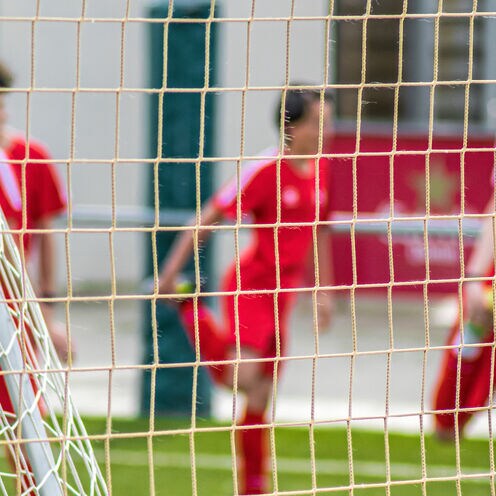
Want to Support Children? Let Them Play
Restricting transgender athletes from teams that align with their gender identity limits opportunities for all children to play and be their true selves.
As a child, sports were everything to me. They still are.
Growing up in a small, rural, predominantly white town in Northern California, playing sports gave me space to explore my identity, to discover who I was, and to find empowerment that was not defined by being targeted as a brown kid, an Indian kid, a girl. As I got older, sports were where I found myself. I started playing golf when I was 3, along with competitive swimming, tennis, soccer, and picking flowers in the outfield during softball games.
Playing golf in particular has always felt like the one time when I could be me, enjoying the endless chase of perfection that is always just out of reach, learning to rely on and trust yourself because you’re the only one out there, swinging the club, hitting the ball and watching it soar down the fairway. It didn’t matter what the color of my skin was, that I was a girl, or that I am queer. All that mattered was how I hit the ball.
Golf is where I found who I am. But that opportunity for self-discovery and the freedom to play is at risk for too many children, particularly those who are transgender.
There are more than 250 bills that have been introduced in 2021 across the country targeting trans youth and their access to healthcare and sports. These bills aim to codify the policing of bodies that do not “conform” to specific heteronormative and white supremacist standards. Many of those bills are still pending in legislatures, but the fact that they have made it as far as they have sends the clear and damaging statement that no, kids cannot be kids: They must conform in order to play the games they love.
When I turned professional in 2015, I was chasing my dream, ecstatic for all that there was to come until I kept hearing club members and tournament directors make discriminatory comments and jokes about LGBTQ+ folks, about women, about South Asians and immigrants. I had to take a step back from the sport before I achieved my dreams because it was a battle going to the course day after day and hearing in various forms this pressure to conform, to negotiate between my identities so as to be palatable and not targeted. It got to a point where I couldn’t balance the constant bracing I felt when I got to the course or entered any golf space—the pressure to prove that despite my queerness, my brownness, my womanhood, I belonged there, playing the game I love and chasing my dream of an LPGA card. I cannot begin to describe the pain of feeling like you are being told, “Sure you’re good and you can play, but because of who you are, because of what you look like and how you identify, you cannot play.”
The difference, though, is that I had a chance to access sports, to find myself, to find my home in golf before I felt the pressure to conform. These anti-trans bills rob kids of access to those opportunities. The bills send the clear message that being able to play is dependent on conforming.
Legislators are sending that message despite relevant and groundbreaking Supreme Court rulings. Last summer, the Supreme Court held in Bostock v. Clayton County that under Title VII, discrimination on the basis of sex includes sexual orientation and gender identity. In other words, discrimination because of a person’s sexual orientation or gender identity is prohibited.
Bostock still left a few things uncertain. It was a ruling on Title VII, a key workforce discrimination law, and how would it impact Title IX and other statutes concerning discrimination on the basis of sex. Courts often treat Title VII as a persuasive precedent for Title IX analysis. This has been demonstrated in other cases such as Adams v. School Board of St. Johns County, where the 11th Circuit held that excluding a student on the basis of their transgender identity is impermissible discrimination on the basis of sex. Similarly, last year, the 9th Circuit restrained Idaho’s anti-trans sports bill (HB500) from going into effect because it is likely unconstitutional.
In January, just days after taking office, President Joe Biden signed Executive Order 13988 on “Preventing and Combating Discrimination on the Basis of Gender Identity or Sexual Orientation,” which implemented the protections that the Bostock ruling granted to LGBTQ+ people. A few months later, the Civil Rights Division of the U.S. Justice Department issued a memo reaffirming that Title IX prohibits discrimination on the basis of sex, including gender identity and sexual orientation.
In short, policies that seek to exclude students on the basis of their gender identity violate Title IX. This is undeniably powerful in the affirmation and recognition of LGBTQ+ people under anti-discrimination statutes, but it also highlights the blatant discrimination of legislation targeting trans kids for no other reason than that they are trans.
But legalese aside, the point is that people in positions of power throughout the country are—in violation of anti-discrimination statutes, case law, and executive orders—seeking to prevent children from being able to play, from being able to be kids. Anti-trans bills targeting children’s ability to play the games they love and to access healthcare aren’t “protecting women’s sports.” They aren’t protecting anything—and that is precisely the terrifying nature of both the proposed legislation and the rhetoric surrounding it.
Maya Reddy is a queer South Asian former professional golfer, LGBTQ+ athlete activist, Athlete Ally ambassador, founder of the Queer Asian Social Club, and a Toll Public Interest Scholar in the University of Pennsylvania Law School class of 2022. She was a three-time NCAA All-American and gained status on the Symetra Tour before having to take a step back from the sport due to its exclusive culture and the many harmful experiences she endured as a result of that culture. Reddy focused her pain in fighting for and becoming an advocate for LGBTQ-inclusive policies in sports and decided to pursue a law degree to strengthen her work in inclusive policy formation, advocacy, and litigation defending trans and queer athletes.
We want to hear your opinions! To submit an idea for an Opinion piece or offer feedback on this story, visit our Suggestion Box.
The opinions expressed in this piece, and all others in our Opinion section, represent those of the authors and do not necessarily reflect the views and opinions of the Teach For America organization.
Sign up to receive articles like this in your inbox!
Thanks for signing up!
Content is loading...










